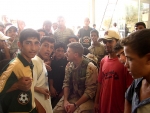 Iraqi teens have relatively high levels of self esteem, according to a University of Cincinnati study. Not only that, but “the higher the perceived threat of the war, the higher the teens reported their self-esteem.”
Iraqi teens have relatively high levels of self esteem, according to a University of Cincinnati study. Not only that, but “the higher the perceived threat of the war, the higher the teens reported their self-esteem.”
The researchers say that though this finding may seem counterintuitive, it supports their theory that during a war, individuals’ sense of self is tied to their sense of national identity:
“In the presence of conflict-related trauma one generally observes lower levels of psychological well-being (e.g., PTSD, grief reactions), and sometimes lower self-esteem,” write the authors. “Our results, however, are consistent with a body of theory and research that predicts self-esteem striving and higher self-esteem among the individuals who face indirect threats to central components of their social identities (rather than directly facing traumatic war-related events). In other words, in a situation where we observe a broad social context involving the presence of foreign forces ( a clear violation of Muslim principles) combined with general violence throughout Baghdad and Iraq, we also observe a heightened sense of self, at least to the extent that one’s self is tied to one’s nation.”
Now I haven’t delved into the particulars of the study, but a few things jumped out at me as I glanced over the details. First off, it’s worth noting that there was a pretty big gender gap—70 percent of the teens surveyed were male. The findings weren’t broken down by gender, but it’d be interesting to see whether boys and girls had roughly the same self-esteem levels. Another thing to keep in mind: All the teens in the survey were in Baghdad. Would the results have been different, say, in Tikrit? Finally: The teens were surveyed in 2004, when things looked pretty different in Baghdad. How did teenagers’ lives—and self image—change as the situation in Iraq became more and more chaotic?













